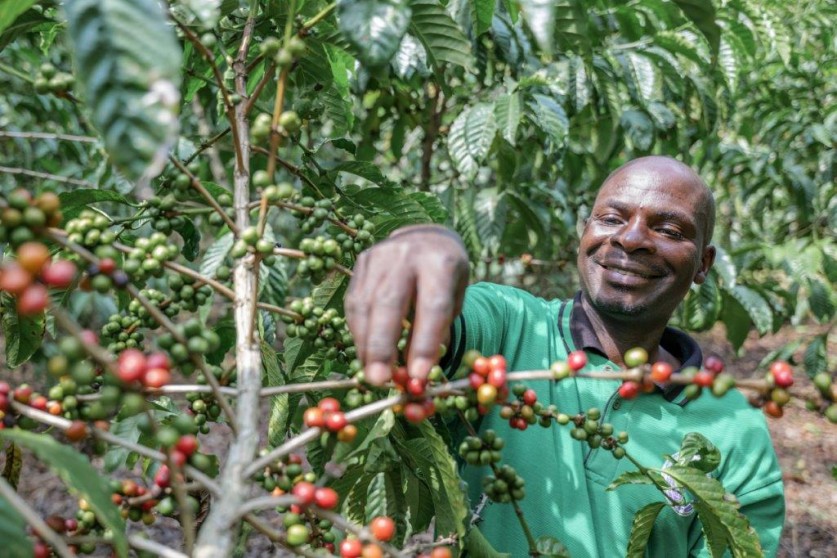Banyankole coffee services
Banyankole Coffee Services: Coffee Producer Based in Uganda
Situated around 1,500m above sea level lies Kabwohe; a town in the Sheema District of western Uganda. An area that is characterised by rolling hills and lush vegetation.
Coffee is a major export crop in Uganda and as a result is a significant contributor to the country’s economy by providing foreign exchange earnings, employment and income opportunities across the supply chain.
The Kabwohe area is ideal for coffee farming due to its favourable altitude, nutrient-rich soil, consistent rainfall, and proximity to major coffee markets. The area’s high altitude slows down the ripening process of coffee cherries, resulting in higher-quality beans.
The nutrient-rich volcanic soil in Kabwohe supports the development of healthy plants and high-quality coffee beans. Consistent rainfall ensures that coffee plants have sufficient moisture to produce high yields of quality coffee beans. Finally, proximity to coffee markets in Uganda facilitates easy access to markets and helps support the livelihoods of coffee farmers.
Shared Interest and Banyankole Coffee Services
BCS have been a Shared Interest customer since 2020, receiving loans to meet export demands from their buyers.
Empower smallholder farmers
Lauben Kurubaija, Managing Director, said:
“We have received excellent services provided by Shared Interest Foundation and Shared Interest Society, which have enabled us to sustain and grow our operations.
“Sincerely speaking, the loan from Shared Interest has helped us so much that we are always assured of capital to respect our buyers contracts in time."
“Shared Interest finance has pushed Banyankole Coffee Services to a new level.”
The Impacts of Climate Change on Coffee Production in Uganda
The Kabwohe area is ideal for coffee farming due to its favourable altitude, nutrient-rich soil, consistent rainfall, and proximity to major coffee markets. The area’s high altitude slows down the ripening process of coffee cherries, resulting in higher-quality beans.
The nutrient-rich volcanic soil in Kabwohe supports the development of healthy plants and high-quality coffee beans. Consistent rainfall ensures that coffee plants have sufficient moisture to produce high yields of quality coffee beans. Finally, proximity to coffee markets in Uganda facilitates easy access to markets and helps support the livelihoods of coffee farmers.
Uganda’s economy heavily relies on agricultural commodities like coffee, grown mainly by smallholder farmers. These farmers often have limited access to inputs such as fertiliser or seeds and information about adequate adaptive strategies to combat climate change.
These farmers are almost entirely dependent on rain-fed agriculture, and for around 70% of coffee households, farming is the main source of income.
Over the past three decades, coffee-producing areas in Uganda have faced:
- Drier and warmer conditions
- Increasing annual temperatures which result in a loss of moisture from the leaves and soil
- More variable rainfall distribution
These changes have led to increased pests, diseases, soil erosion, irregular coffee flowering, unpredictable harvest seasons and ultimately reduced crop yields and quality.
Speaking about the challenges BCS are currently experiencing, Managing Director Lauben Kurubaija said:
“BCS are facing low deliveries due to a poor coffee harvest. But we have a new peak season with good coffees coming in October to January next year.”
"We are seeing coffee diseases, however our agronomist has been advising on means of dealing with these, and we have seen a great improvement from their most recent report.
“We also struggle with lack of capacity to implement the EUDR regulation on deforestation. Previously BCS had collected data for only 500 farmers and was short of funds. But we have fully implemented that from our local sales and been able to collect data for the majority of farmers now.”
Specifically, in relation to the impacts of climate change, Lauben said:
Support Sustainable Agriculture"Coffee trees are drying and the quality of our products is reducing because of changing weather patterns, resulting in little or poor deliveries and a reduction in income to the community. However, these are now considered normal effects of climate change and cannot deter any one from producing good quality coffee with the trainings we have received from Shared Interest support.”
Banyankole's Social Impact
BCS has delivered training to the community on environmental conservation practices such as reforestation. The co-operative have also provided coffee seedlings to individual farmers to replace old coffee trees and linked farmers to international markets.
BCS are supporting farmers to overcome many of the environmental challenges they face by focussing their efforts on adapting to the impacts of climate change. This year, they concluded a successful climate resilience project, which Lauben told us directly benefited their farmers.
They are also involved in a beekeeping project, involving diversification to help farmers earn an alternative revenue stream from coffee. The organisation, in addition, provides advances to farmers, which helps them to meet their basic needs such as education for their children.
Lauben told us:
"Training has been provided on agroforestry, agribusiness, beekeeping skills, and honey harvesting skills to more than 300 farmers."
“The project has also provided 12,000 good variety coffee seedlings and 4,300 shade trees to 300 farmers, as well as over 1,000 beehives to 210 BCS farmers.”
BCS farmer, John Kibuzo, said:
Create Thriving Communities"BCS did open our eyes and protected us from the cheating of coffee middle men with their compromised scales and low prices; and as of now a lot of benefits have been achieved from BCS, namely: coffee premium funds from our Fairtrade sales, high prices from our coffees, trainings in agroforestry, supply of quality seedlings, diversification of our income with bee projects, to mention but a few."

